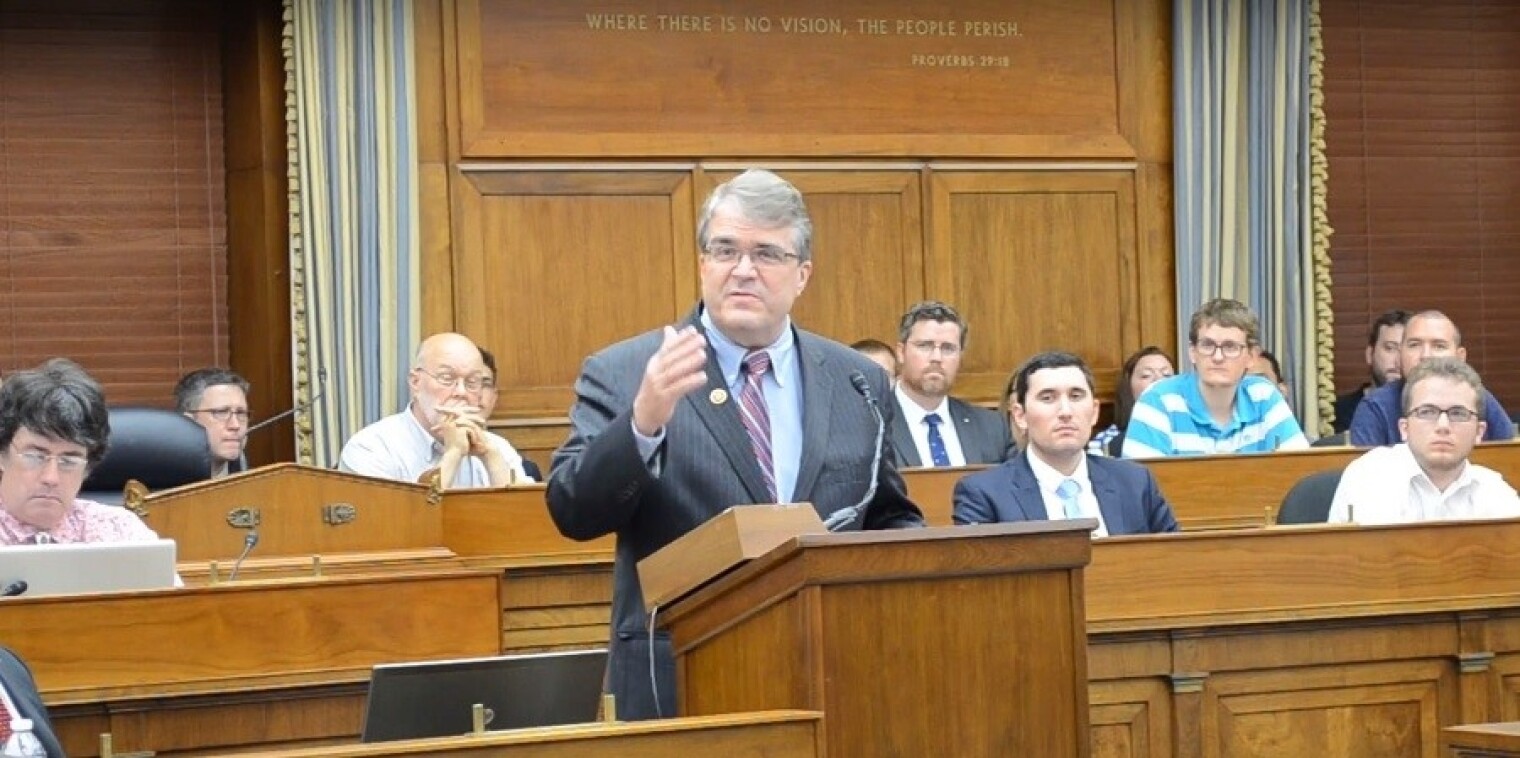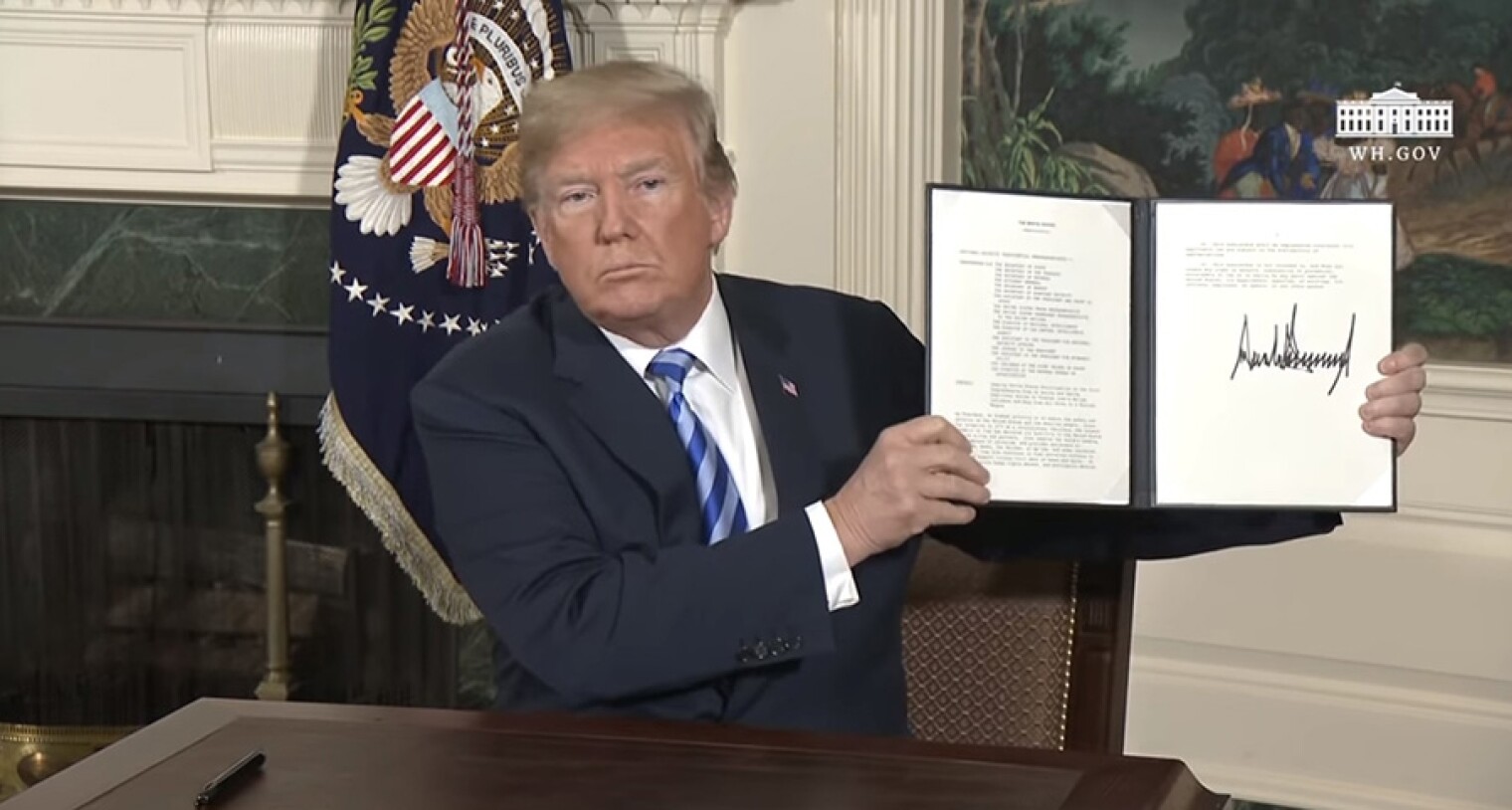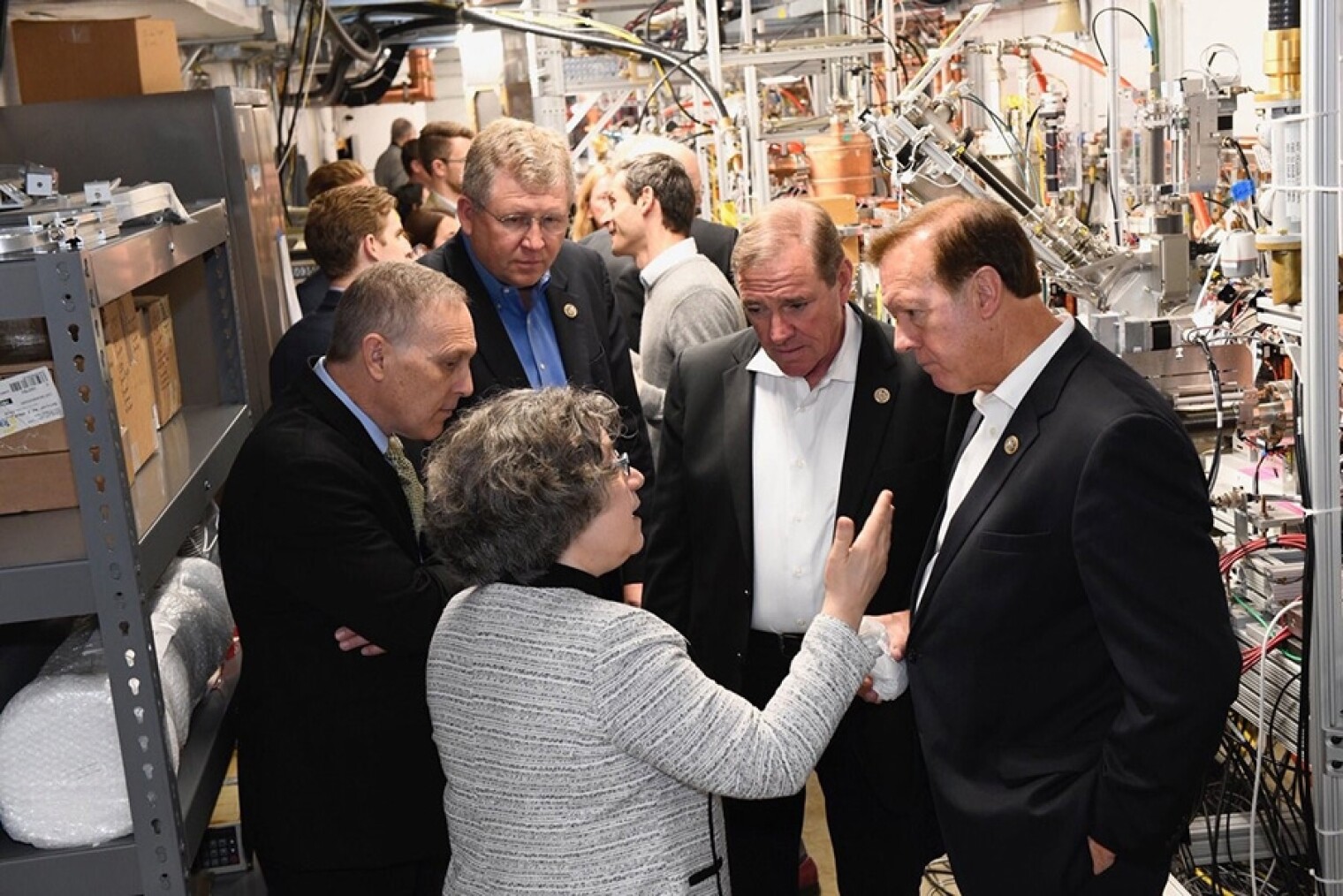| |
What’s Ahead
 |
| Commerce-Justice-Science Appropriations Subcommittee John Culberson (R-TX), center, speaking about the possibility of finding life on Jupiter’s moon Europa at a 2014 Capitol Hill event hosted by The Planetary Society. (Image credit – Office of Rep. John Culberson) |
Science Spending Bills Set to Advance to House Floor
The House Appropriations Committee has scheduled meetings this week to advance the fiscal year 2019 appropriations legislation that funds a large swath of federal science agencies and programs. On Wednesday, the committee will consider the Energy-Water bill, which funds the Department of Energy, and on Thursday the committee will take up the Commerce-Justice-Science bill, which funds NASA, the National Science Foundation, the National Institute of Standards and Technology and the National Oceanic and Atmospheric Administration. Drafts of the bills approved at the subcommittee level last week indicate that House appropriators are seeking substantial topline budget increases for DOE, NASA, and NSF, while slashing support for NOAA, including its climate research. Either shortly before or after the markups, the committee will release reports that detail how it expects agencies to distribute topline dollar amounts among their programs.
Science Committee to Revisit How Best to Address Climate Change
On Wednesday, the House Science Committee is holding a hearing titled “Using Technology to Address Climate Change.” Under the chairmanship of Rep. Lamar Smith (R-TX), the committee’s climate-related hearings have often been combative, routinely featuring witnesses critical of mainstream climate science. Although Smith has derided what he calls “ alarmist” views on climate change and resists regulatory approaches to addressing climate change, he does acknowledge the climate is changing. He has suggested, most recently in an op-ed published last week, that promoting advances in technology is a more appropriate means of addressing climate-related threats. The Republican-invited witnesses at this week’s hearing are: Manhattan Institute senior fellow Oren Cass, Breakthrough Institute Executive Director Ted Nordhaus, and climate scientist Judith Curry. The Democrats have invited Woods Hole Research Center President Phil Duffy.
Energy and Commerce Committee Turns to Quantum Tech
The House Energy and Commerce Committee will be holding a subcommittee hearing on Friday on quantum computing as part of its ongoing “Disrupter Series.” The witnesses are QxBranch CEO Michael Brett, IonQ Chief Scientist and University of Maryland professor Christopher Monroe, and Nanotronics CEO Matthew Putnam. The potential of quantum science and technology has recently become a subject of significant interest on Capitol Hill, with the House Science Committee also exploring the subject at a hearing last October. It is anticipated that legislation to support quantum R&D could be introduced this year, and the White House Office of Science and Technology Policy is also prioritizing it as an emerging research frontier of strategic national importance.
High Energy Physics Advisory Panel to Meet
The advisory panel for the high energy physics programs at the Department of Energy and the National Science Foundation is meeting Monday and Tuesday. DOE officials will be delivering their first updates to the panel since the enactment of fiscal year 2018 appropriations brought a 10 percent increase in funding to the DOE High Energy Physics (HEP) program. The panel will report on its review of HEP’s portfolio, initiated last fall to help the department prioritize its current experiments and plan for the future. Other presentations will focus on activities at the DOE Advanced Scientific Computing Research program, HEP’s Cosmic Visions Dark Energy program, and the use of basic research needs workshops and technology roadmaps to guide the DOE HEP program.
Hearings to Revolve Around the International Space Station
On Wednesday, the Senate Commerce Committee will hold the first of two hearings focused on the future of the International Space Station. Testifying before the Space, Science, and Competitiveness Subcommittee are the head of NASA’s Human Exploration and Operations Directorate, William Gerstenmaier, and the agency’s inspector general. Subcommittee Chair Ted Cruz (R-TX) has criticized the Trump administration’s proposal to end direct federal funding for the station starting in 2025 and has advocated that the station be extended for as long as it has “scientifically usable life.” Gerstenmaier will also testify on Thursday at a House Science Committee hearing on programs that support America’s human presence in low-earth orbit. Cruz’s counterpart in the House, Space Subcommittee Chair Brian Babin (R-TX), has said he is open to transferring operation of the space station to the private sector in 2025 but only if the plan has adequate buy-in from stakeholders.
NIH Leaders Head to the Hill to Defend Budget
On Thursday, the Senate Appropriations Subcommittee with jurisdiction over the National Institutes of Health is holding a hearing to review the president’s budget request for the biomedical research agency. NIH Director Francis Collins will testify alongside the directors of the agency’s institutes focused on cancer, neurological disorders, infectious diseases, aging, and drug abuse. Congress resoundingly rejected the president’s previous budget cuts for NIH, providing the agency with a $3 billion boost in fiscal year 2018 appropriations.
AAS Holding Space Weather Hill Briefing
As part of its “Space on the Hill” series, the American Astronomical Society is holding a congressional briefing on Wednesday to highlight new advancements in the science of space weather. Speakers include incoming NASA Heliophysics Division head Nicky Fox and the principal investigators of two NASA missions that focus on the dynamics of Earth’s upper atmosphere. NASA’s role in supporting fundamental research on space weather was spotlighted at a recent House Science Committee hearing.
|
|
In Case You Missed It
 |
| President Trump signed a memorandum on May 8 that withdraws the U.S. from the Joint Comprehensive Plan of Action — an international agreement struck by his predecessor to restrict Iran’s nuclear programs — and re-imposes sanctions that were lifted as part of the deal. (Image credit - White House) |
Moniz Condemns Trump’s Withdrawal from Iran Nuclear Deal
President Trump, long a critic of the international agreement struck by his predecessor to constrain Iran’s ability to develop nuclear weapons, announced last week that the U.S. will exit the deal and reimpose economic sanctions. Among his justifications, Trump said the deal did not provide adequate mechanisms to verify that Iran was honoring the agreement and contained sunset provisions that would allow Iran to revive its nuclear program. Former Energy Secretary Ernest Moniz, who was instrumental to negotiating the agreement, called the withdrawal a “major strategic mistake” and criticized Trump’s characterization of the deal, saying it “imposed uniquely stringent monitoring and verification measures — the most important elements of which were permanent — to prevent the country from ever developing a bomb.” At a House Science Committee hearing last week, members asked current Energy Department leaders whether the White House made use of the department’s technical expertise in deciding whether to withdraw. In response to a question from Rep Bill Foster (D-IL), a physicist who supported the deal after personally reviewing its technical dimensions, Energy Secretary Rick Perry offered to give examples in a classified setting of how the department has supported the administration’s latest decisions on nuclear matters. In a statement reacting to the withdrawal, Foster argued that it is an example of Trump’s “technical ignorance.”
NSF and Air Force Establish New Research Partnership
On May 9, the National Science Foundation and the U.S. Air Force signed a letter of intent to coordinate their activities on mutual research interests. The letter notes the partnership will provide the Air Force with “greater access to NSF’s expertise in basic research,” while providing NSF with “a direct pathway for the technical maturation of many of its research efforts and products, with increased relevance afforded by its direct support of the Nation’s defense posture.” Initial focus areas being considered are space operations and geosciences; advanced material sciences; information and data sciences; and workforce and processes.
Annual Defense Authorization Bill Moves to the House Floor
Following a marathon meeting on May 9, the House Armed Services Committee approved its version of the National Defense Authorization Act (NDAA) for Fiscal Year 2019 on a vote of 60 to 1. One point of debate was a provision authorizing the National Nuclear Security Administration to develop a submarine-launched low-yield nuclear weapon to deter potential Russian use of a similar-scale weapon in combat. Opponents argue the availability of such a weapon would make nuclear war more likely. Another controversial provision, introduced as an amendment by Rep. Mike Gallagher (R-WI), would deny DOD funding for any student or researcher who “has participated or is currently participating in a foreign talent or expert recruitment program” operated by China, North Korea, Russia, or Iran. The measure reflects growing bipartisan concern that some researchers from those nations working in U.S. labs are exploiting their access to American intellectual property on behalf of their home countries. Despite objections that the disqualifying programs are poorly defined, the committee approved the amendment by voice vote on the understanding the issue will be revisited before a final law is passed. Senators will begin considering their chamber’s version of the NDAA in closed markup sessions next week.
DOE Cancels MOX Plant, Plans to Use Site for Plutonium Pit Production
The Department of Energy has decided to cease construction of its Mixed Oxide (MOX) Fuel Fabrication Facility at the department’s Savannah River Site in South Carolina. According to the Aiken Standard, on May 10 Energy Secretary Rick Perry formally invoked a provision in the fiscal year 2018 appropriations law that permits the department to withdraw from the project under certain conditions. The MOX facility was intended to convert plutonium from nuclear weapons into usable fuel for nuclear reactors but had become mired in delays and rapidly ballooning costs. Meanwhile, DOE and the Defense Department announced the facility would be repurposed to produce plutonium pits, which serve as the cores of nuclear weapons. DOE is statutorily required to ramp up production to 80 pits per year by 2030 to replace aging ones currently installed in warheads. Sen. Martin Heinrich (D-NM), who advocates expanding an existing pit production facility at Los Alamos National Laboratory, condemned the decision at a hearing just prior to the announcement, saying he believes DOE will need to “go back to the drawing board and fix this.” All but two members of the South Carolina congressional delegation signed on to a joint statement objecting to discontinuing the MOX facility while welcoming the news about pit production.
House Passes Bill to Revive Yucca Mountain Repository
On a vote of 340 to 72, the House passed a bill on May 10 directing the Department of Energy to resume licensing of the Yucca Mountain nuclear waste repository in Nevada and to temporarily store waste at an interim storage facility. Although the Trump administration has prioritized moving forward with Yucca Mountain and there is bipartisan support for the facility in Congress, opposition remains strong enough to stymie progress. Appropriators have denied funding to the project, and Sen. Dean Heller (R-NV) has said he plans to block the House bill from proceeding in the Senate, calling it “dead on arrival.”
House Appropriators Considering Office of Technology Assessment Revival
Advocates of a long-running campaign to revive a shuttered office that provided Congress with advice on science and technology matters got a bit of news to cheer last week. The report accompanying the House’s draft appropriations bill that funds congressional operations includes a provision directing the Congressional Research Service to “assess the potential need within the Legislative Branch to create a separate entity charged with the mission of providing nonpartisan advice on issues of science and technology.” Describing the rationale for the study, the report states, “The committee has heard testimony on, and received dozens of requests advocating for restoring funding to the Office of Technology Assessment (OTA), and more generally on how Congress equips itself with the deep technical advice necessary to understand and tackle the growing number of science and technology policy challenges that face our country.“ Until it was defunded in 1995, OTA produced a large number of reports for Congress on subjects ranging from the feasibility of space-based missile defense systems to the impact of automation on the workforce.
 |
| During a tour of Fermilab by members of the House Science Committee last week, Proton Improvement Plan-II Project Director Lia Merminga explained how the lab is developing advanced beam technology to power the Deep Underground Neutrino Experiment to Reps. Andy Biggs (R-AZ), Frank Lucas (R-OK), Neal Dunn (R-FL), and Randy Weber (R-TX). (Image credit – Fermilab) |
Science Committee Quizzes Perry, Visits Illinois National Labs
On May 9, Energy Secretary Rick Perry testified before the House Science Committee and answered members’ questions on DOE’s fiscal year 2019 budget request, one day before a delegation of seven committee members visited Argonne and Fermi National Laboratories outside Chicago. At the hearing, Perry, Committee Chair Lamar Smith (R-TX), and Ranking Member Eddie Bernice Johnson (D-TX) spoke glowingly about the national laboratories, while Johnson pressed Perry on the administration’s proposed cuts to ARPA–E and renewable energy R&D. Smith asked about the role that technology development plays in addressing climate change and the importance of U.S. participation in ITER, a major fusion energy facility under construction in France. Perry highlighted a DOE project in Houston that he says has demonstrated 95 percent carbon dioxide capture and utilization from a power plant. And he identified fusion as a future technology that “ has the potential to really change the world,” but said he wants to ensure ITER will be “ a good return on our investment” before committing to further U.S. support. He did add he is “ getting comfortable” that ITER management is “ back on track.”
|
|
Opportunities AAAS Hosting Symposium on Inclusivity in Science Policy
The American Association for the Advancement of Science invites members of the scientific community to attend a May 18 symposium entitled “Scientists as Effective Policy Leaders: The Role of Inclusivity at the Intersections of Science, Business, Community, and Government.” The event aims to facilitate discussion among leaders from different sectors to discuss strategies for developing inclusivity and promoting diversity.
NSF Seeking Input on Updated Proposal and Award Guidance
The National Science Foundation is seeking public input on an update of its Proposal and Award Policies and Procedures Guide. Among the changes in the new version are new reporting requirements on sexual harassment and other misconduct and updated guidelines on intellectual property management. The agency is requesting specific feedback on how to minimize the reporting burden of grantees and if the proposed information to be collected is necessary. Comments should be submitted by July 13.
Know of an upcoming science policy opportunity? Email us at fyi@aip.org.Know of an upcoming science policy event? Email us at fyi@aip.org.
|
|
Around the Web
News and views currently in circulation. Links do not imply endorsement.
White House
Congress
Political Engagement
Science, Society, and the Economy
Education and Workforce
Research Management
Labs and Facilities
Energy
Space
Weather, Climate, and Environment
Defense
Biomedical
International Affairs
|
|
|
| |
| |
|


